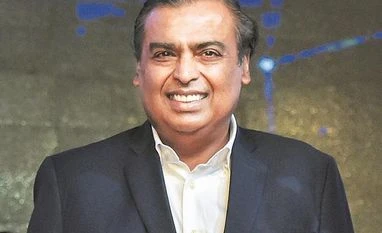Reliance Industries (RIL) — the oil-to-telecom conglomerate, led by billionaire Mukesh Ambani, is counting on each of its business segments for growth, as it positions itself for the future.
Addressing shareholders in its latest annual report, Ambani — RIL’s chairman and director — said the company’s key business verticals had emerged as “extremely agile and highly potent growth engines”, which were moving into top gear. The company counts oil-to-chemicals (O2C), retail, telecom and digital services among its key segments.
For financial year 2021-22 (FY22), Reliance posted a 47 per cent year-on-year jump in consolidated revenue to Rs 7.92 trillion and 26.2 per cent increase (y-o-y) in net profit to Rs 67,845 crore. FY22 was also the year when it crossed $100 billion in annual revenue. O2C, which includes refining, petrochemicals and fuel retail, contributed 56.8 per cent to FY22 revenue; retail contributed 22.7 per cent and telecom and digital services contributed 11.4 per cent, its annual report shows.
RIL also added 232,000 jobs in FY22, of which 168,000 jobs were added in retail and 57,883 jobs in Reliance Jio. The company’s total workforce at the end of FY22 stood at 343,000, its annual report said. The company also aided 170 start-ups as part of its incubator programme JioGenNext, helping them raise over Rs 2,600 crore in early-stage venture capital since 2014.
Key business verticals were also investing for the future, with Reliance Retail, the country’s largest retailer, alone making investments of nearly Rs 30,000 crore in FY22. It also added 2,500 stores and 11.1 million sq ft of warehousing space during the year.
“Braving the intermittent Covid-19 restrictions, the retail business continued to expand offline, as well as online,” Ambani said. “The business posted all-time high revenues and Ebitda, with steady improvement in profit margins. Growth was seen across all product categories from consumer electronics to grocery to apparel and footwear. Even the relatively smaller segments of jewellery, pharma and furniture and home décor, and new businesses like Freshpik and Milkbasket, witnessed rapid growth,” he said.
Reliance Jio, the country’s largest mobile service provider, meanwhile, completed 5G coverage planning in the top-1,000 cities based on targeted customer consumption and revenue potential, and had put in place several use cases for 5G, Ambani said.
Last week, Reliance Jio emerged the largest bidder for 5G spectrum, acquiring close to half of all airwaves sold for Rs 88,078 crore. Jio was also the only company to purchase spectrum in 700 Mhz band. It plans to develop a standalone independent 5G network, providing telecom solutions to enterprises and consumers.
“Jio’s network is built on a converged and future proof architecture that allows for seamless upgrade from 4G to 5G and beyond,” the company said.
As far as its green energy business is concerned, Ambani has big plans for the vertical, leveraging manufacturing and execution capabilities, innovation, technology and partnerships. The rapidly evolving segment, Ambani said, could see it potentially outshine other business verticals in 5-7 years.
Reliance had last year announced a Rs 75,000-crore investment over three years as part of its new energy push, which will be used to bridge the green energy divide, Ambani had said.
In FY22, the company spent over Rs 5,500 crore to build capabilities in the new energy, including entering into partnerships and completing acquisitions. This included partnerships with companies such as Ambri in the US, Faradion in the UK, and The Netherlands-based Lithium Werks in the energy storage space.
RIL also acquired REC Solar — a global technology leader in solar panel manufacturing and picked up 40 per cent stake in Sterling & Wilson Renewable Energy. “Over the next 12 months, our investments across the green energy value chain will gradually start going live, scaling up over the next couple of years. This new growth engine holds great promise to outshine all our existing growth engines in just 5-7 years,” Ambani said.
Unlock 30+ premium stories daily hand-picked by our editors, across devices on browser and app.
Pick your 5 favourite companies, get a daily email with all news updates on them.
Full access to our intuitive epaper - clip, save, share articles from any device; newspaper archives from 2006.
Preferential invites to Business Standard events.
Curated newsletters on markets, personal finance, policy & politics, start-ups, technology, and more.
)